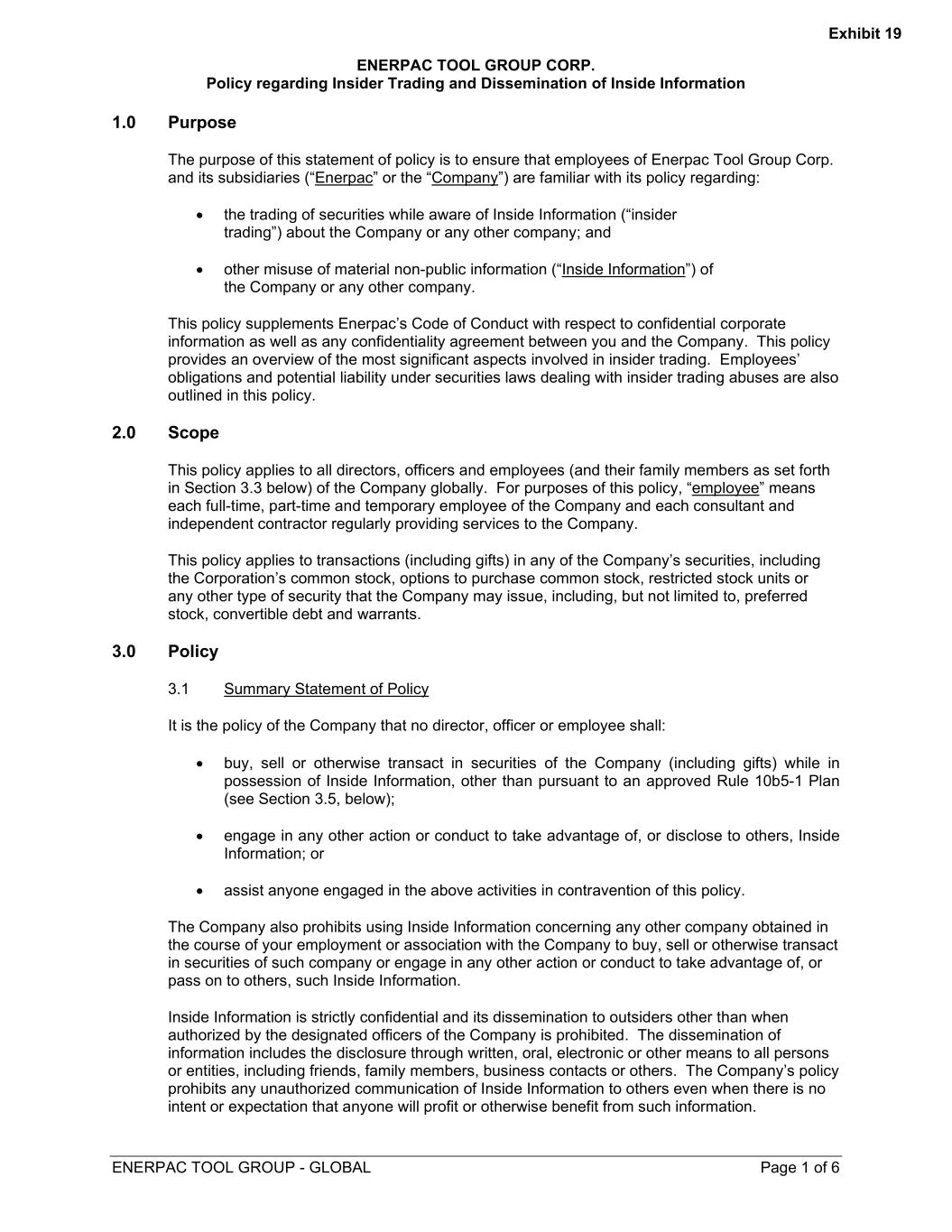
ENERPAC TOOL GROUP CORP. Policy regarding Insider Trading and Dissemination of Inside Information ENERPAC TOOL GROUP - GLOBAL Page 1 of 6 1.0 Purpose The purpose of this statement of policy is to ensure that employees of Enerpac Tool Group Corp. and its subsidiaries (“Enerpac” or the “Company”) are familiar with its policy regarding: • the trading of securities while aware of Inside Information (“insider trading”) about the Company or any other company; and • other misuse of material non-public information (“Inside Information”) of the Company or any other company. This policy supplements Enerpac’s Code of Conduct with respect to confidential corporate information as well as any confidentiality agreement between you and the Company. This policy provides an overview of the most significant aspects involved in insider trading. Employees’ obligations and potential liability under securities laws dealing with insider trading abuses are also outlined in this policy. 2.0 Scope This policy applies to all directors, officers and employees (and their family members as set forth in Section 3.3 below) of the Company globally. For purposes of this policy, “employee” means each full-time, part-time and temporary employee of the Company and each consultant and independent contractor regularly providing services to the Company. This policy applies to transactions (including gifts) in any of the Company’s securities, including the Corporation’s common stock, options to purchase common stock, restricted stock units or any other type of security that the Company may issue, including, but not limited to, preferred stock, convertible debt and warrants. 3.0 Policy 3.1 Summary Statement of Policy It is the policy of the Company that no director, officer or employee shall: • buy, sell or otherwise transact in securities of the Company (including gifts) while in possession of Inside Information, other than pursuant to an approved Rule 10b5-1 Plan (see Section 3.5, below); • engage in any other action or conduct to take advantage of, or disclose to others, Inside Information; or • assist anyone engaged in the above activities in contravention of this policy. The Company also prohibits using Inside Information concerning any other company obtained in the course of your employment or association with the Company to buy, sell or otherwise transact in securities of such company or engage in any other action or conduct to take advantage of, or pass on to others, such Inside Information. Inside Information is strictly confidential and its dissemination to outsiders other than when authorized by the designated officers of the Company is prohibited. The dissemination of information includes the disclosure through written, oral, electronic or other means to all persons or entities, including friends, family members, business contacts or others. The Company’s policy prohibits any unauthorized communication of Inside Information to others even when there is no intent or expectation that anyone will profit or otherwise benefit from such information. Exhibit 19
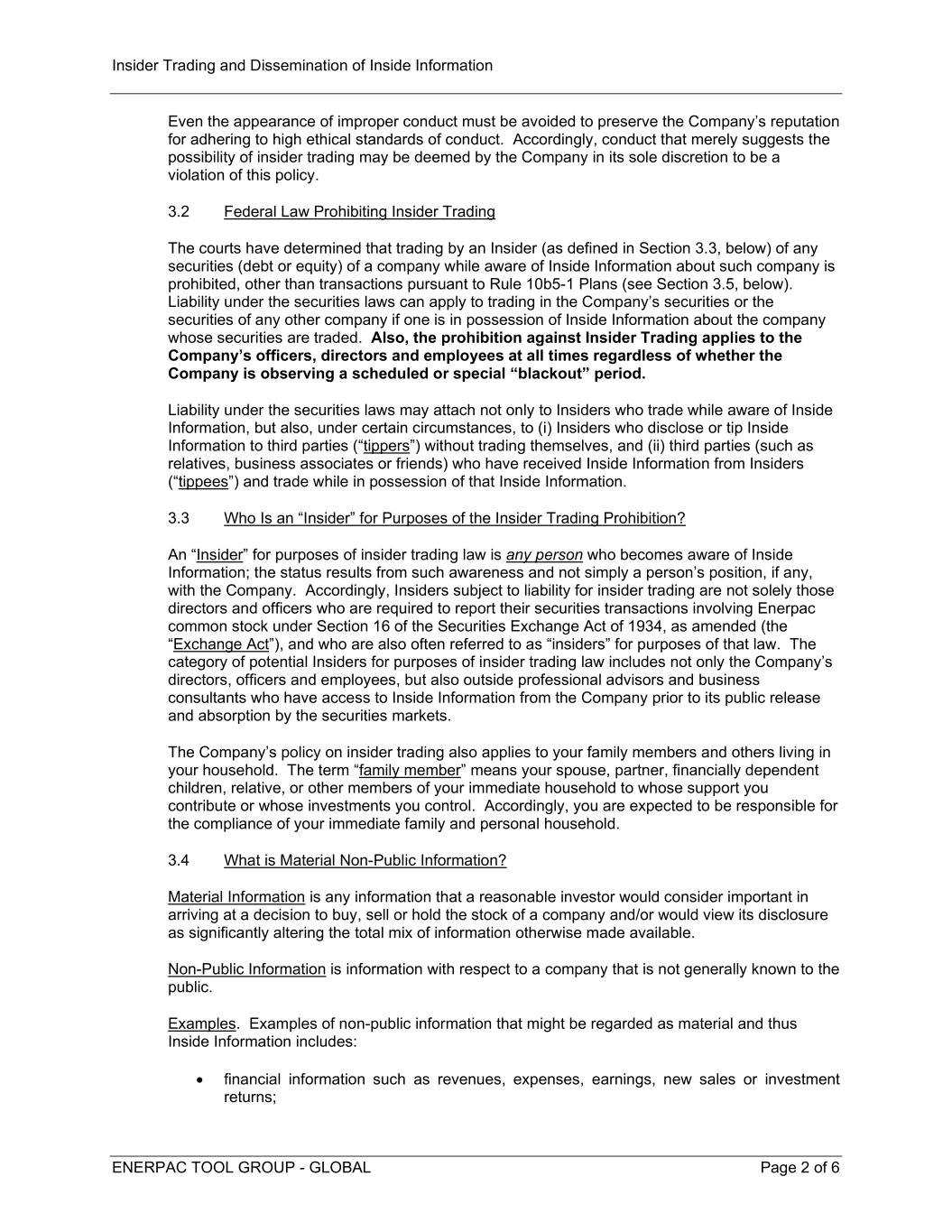
Insider Trading and Dissemination of Inside Information ENERPAC TOOL GROUP - GLOBAL Page 2 of 6 Even the appearance of improper conduct must be avoided to preserve the Company’s reputation for adhering to high ethical standards of conduct. Accordingly, conduct that merely suggests the possibility of insider trading may be deemed by the Company in its sole discretion to be a violation of this policy. 3.2 Federal Law Prohibiting Insider Trading The courts have determined that trading by an Insider (as defined in Section 3.3, below) of any securities (debt or equity) of a company while aware of Inside Information about such company is prohibited, other than transactions pursuant to Rule 10b5-1 Plans (see Section 3.5, below). Liability under the securities laws can apply to trading in the Company’s securities or the securities of any other company if one is in possession of Inside Information about the company whose securities are traded. Also, the prohibition against Insider Trading applies to the Company’s officers, directors and employees at all times regardless of whether the Company is observing a scheduled or special “blackout” period. Liability under the securities laws may attach not only to Insiders who trade while aware of Inside Information, but also, under certain circumstances, to (i) Insiders who disclose or tip Inside Information to third parties (“tippers”) without trading themselves, and (ii) third parties (such as relatives, business associates or friends) who have received Inside Information from Insiders (“tippees”) and trade while in possession of that Inside Information. 3.3 Who Is an “Insider” for Purposes of the Insider Trading Prohibition? An “Insider” for purposes of insider trading law is any person who becomes aware of Inside Information; the status results from such awareness and not simply a person’s position, if any, with the Company. Accordingly, Insiders subject to liability for insider trading are not solely those directors and officers who are required to report their securities transactions involving Enerpac common stock under Section 16 of the Securities Exchange Act of 1934, as amended (the “Exchange Act”), and who are also often referred to as “insiders” for purposes of that law. The category of potential Insiders for purposes of insider trading law includes not only the Company’s directors, officers and employees, but also outside professional advisors and business consultants who have access to Inside Information from the Company prior to its public release and absorption by the securities markets. The Company’s policy on insider trading also applies to your family members and others living in your household. The term “family member” means your spouse, partner, financially dependent children, relative, or other members of your immediate household to whose support you contribute or whose investments you control. Accordingly, you are expected to be responsible for the compliance of your immediate family and personal household. 3.4 What is Material Non-Public Information? Material Information is any information that a reasonable investor would consider important in arriving at a decision to buy, sell or hold the stock of a company and/or would view its disclosure as significantly altering the total mix of information otherwise made available. Non-Public Information is information with respect to a company that is not generally known to the public. Examples. Examples of non-public information that might be regarded as material and thus Inside Information includes: • financial information such as revenues, expenses, earnings, new sales or investment returns;

Insider Trading and Dissemination of Inside Information ENERPAC TOOL GROUP - GLOBAL Page 3 of 6 • information about a transaction that will affect the financial condition or performance of the Company; a pending or proposed merger, acquisition or tender offer; sales of assets or the disposition of a subsidiary; • earnings estimates; significant changes in previously announced earnings or earnings estimates; a stock split or the offering of additional securities; • significant litigation, whether as a plaintiff or defendant; • changes in senior management or the company’s auditors; and • the introduction of new products or services; entering into a significant contract; and the gain or loss of a substantial client. 3.5 Rule 10b5-1 Plans Under this policy, a “Rule 10b5-1 Plan” is a written plan for one or more transactions (buying or selling) in the Company’s securities that is entered into and applied in good faith and satisfies the requirements of Rule 10b5-1(c) of the Securities and Exchange Commission (the “SEC”) and is acknowledged and approved by the Company’s General Counsel or his or her designee at the time of its adoption. The SEC adopted Rule 10b5-1(c) to permit individuals, when they are not aware of Inside Information, to adopt plans for future trading in securities even though the transactions may later occur at times when they might be aware of Inside Information. A Rule 10b5-1 Plan cannot be adopted during a quarterly Blackout Period or when the person entering into the plan is aware of Inside Information, and the first trade made pursuant to a Rule 10b5-1 Plan may not occur until after the “cooling-off period” following the date of adoption of the plan has expired, as set forth in Rule 10b5-1(c). For directors and officers, the “cooling-off period” expires at the later of (a) 90 days after the adoption of the Rule 10b5-1 Plan or (b) two business days following the disclosure of the Company’s financial results in a Form 10-Q or Form 10-K for the completed fiscal quarter in which the Rule 10b5-1 Plan was adopted that discloses the Company’s financial results (but, in any event, this required cooling-off period is subject to a maximum of 120 days after adoption of the Rule 10b5-1 Plan). For all other persons subject to this Policy, the “cooling-off period” expires 30 days after the adoption of the Rule 10b5-1 Plan. The Rule 10b5-1 Plan must either specify the amount, pricing and timing of transactions in advance or delegate discretion on these matters to an independent third party and once the Rule 10b5-1 Plan is adopted, the person must not exercise any influence over the amount of securities to be traded, the price at which they are to be traded or the date of the trade. Further, no person subject to this policy may enter into or maintain more than one simultaneous Rule 10b5-1 Plan, except that a person may, in addition to one Rule 10b5-1 Plan to purchase or sell Company securities on the open market, enter into or maintain a Rule 10b5-1 Plan that provides only for eligible sell-to-cover transactions solely to satisfy statutory tax withholding obligations arising exclusively from the vesting of compensatory awards, such as restricted stock units, and the person does not otherwise exercise control over the timing of such sales (an “Eligible Sell-to- Cover Plan”). Additionally, no person subject to this policy may enter into more than one Rule 10b5-1 Plan in a 12-month period designed to effect a single open-market purchase or sale of all the securities covered by such plan (other than an Eligible Sell-to-Cover Plan). You should discuss with the Company’s General Counsel or his or her designee any intention to establish a Rule 10b5-1 Plan prior to adopting such a plan, as well as any intention to amend or terminate an established Rule 10b5-1 Plan prior to taking any such action. Please complete the Permission to Trade form (available on the HUB under “Policies” or by contacting the Legal & Compliance department) and submit it, along with a copy of the proposed Rule 10b5-1 Plan, to ETGStockPlan@enerpac.com at least [5] days prior to the proposed adoption date of the plan.
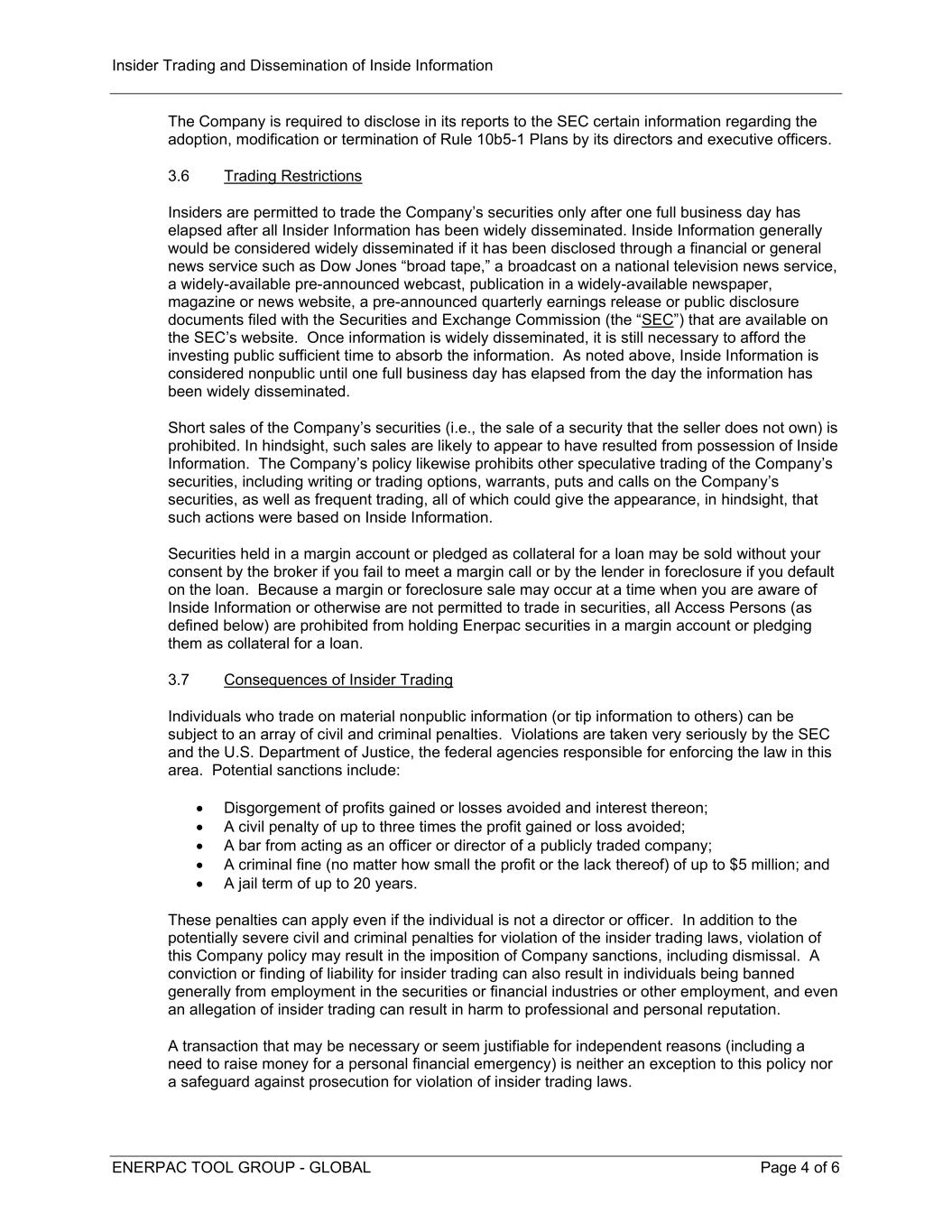
Insider Trading and Dissemination of Inside Information ENERPAC TOOL GROUP - GLOBAL Page 4 of 6 The Company is required to disclose in its reports to the SEC certain information regarding the adoption, modification or termination of Rule 10b5-1 Plans by its directors and executive officers. 3.6 Trading Restrictions Insiders are permitted to trade the Company’s securities only after one full business day has elapsed after all Insider Information has been widely disseminated. Inside Information generally would be considered widely disseminated if it has been disclosed through a financial or general news service such as Dow Jones “broad tape,” a broadcast on a national television news service, a widely-available pre-announced webcast, publication in a widely-available newspaper, magazine or news website, a pre-announced quarterly earnings release or public disclosure documents filed with the Securities and Exchange Commission (the “SEC”) that are available on the SEC’s website. Once information is widely disseminated, it is still necessary to afford the investing public sufficient time to absorb the information. As noted above, Inside Information is considered nonpublic until one full business day has elapsed from the day the information has been widely disseminated. Short sales of the Company’s securities (i.e., the sale of a security that the seller does not own) is prohibited. In hindsight, such sales are likely to appear to have resulted from possession of Inside Information. The Company’s policy likewise prohibits other speculative trading of the Company’s securities, including writing or trading options, warrants, puts and calls on the Company’s securities, as well as frequent trading, all of which could give the appearance, in hindsight, that such actions were based on Inside Information. Securities held in a margin account or pledged as collateral for a loan may be sold without your consent by the broker if you fail to meet a margin call or by the lender in foreclosure if you default on the loan. Because a margin or foreclosure sale may occur at a time when you are aware of Inside Information or otherwise are not permitted to trade in securities, all Access Persons (as defined below) are prohibited from holding Enerpac securities in a margin account or pledging them as collateral for a loan. 3.7 Consequences of Insider Trading Individuals who trade on material nonpublic information (or tip information to others) can be subject to an array of civil and criminal penalties. Violations are taken very seriously by the SEC and the U.S. Department of Justice, the federal agencies responsible for enforcing the law in this area. Potential sanctions include: • Disgorgement of profits gained or losses avoided and interest thereon; • A civil penalty of up to three times the profit gained or loss avoided; • A bar from acting as an officer or director of a publicly traded company; • A criminal fine (no matter how small the profit or the lack thereof) of up to $5 million; and • A jail term of up to 20 years. These penalties can apply even if the individual is not a director or officer. In addition to the potentially severe civil and criminal penalties for violation of the insider trading laws, violation of this Company policy may result in the imposition of Company sanctions, including dismissal. A conviction or finding of liability for insider trading can also result in individuals being banned generally from employment in the securities or financial industries or other employment, and even an allegation of insider trading can result in harm to professional and personal reputation. A transaction that may be necessary or seem justifiable for independent reasons (including a need to raise money for a personal financial emergency) is neither an exception to this policy nor a safeguard against prosecution for violation of insider trading laws.
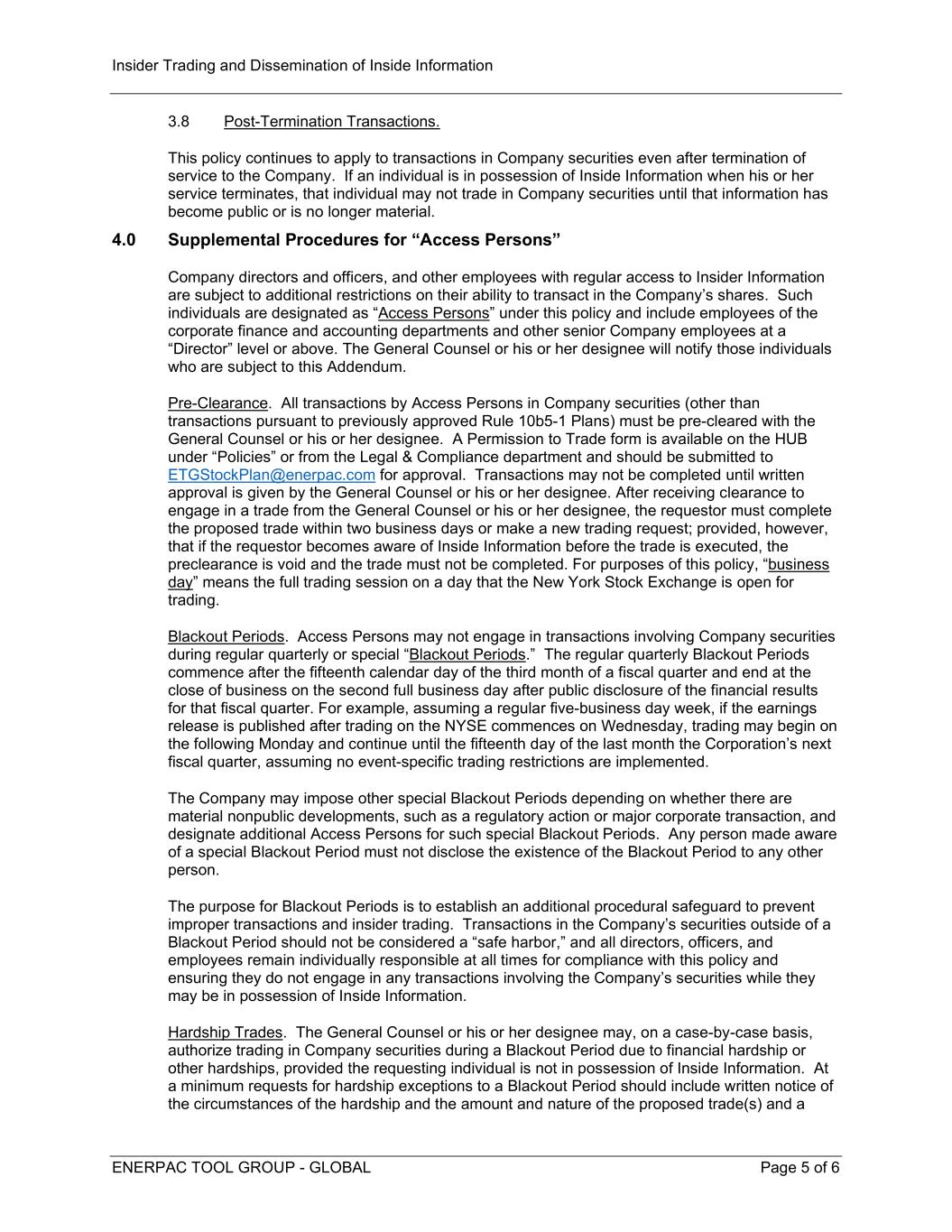
Insider Trading and Dissemination of Inside Information ENERPAC TOOL GROUP - GLOBAL Page 5 of 6 3.8 Post-Termination Transactions. This policy continues to apply to transactions in Company securities even after termination of service to the Company. If an individual is in possession of Inside Information when his or her service terminates, that individual may not trade in Company securities until that information has become public or is no longer material. 4.0 Supplemental Procedures for “Access Persons” Company directors and officers, and other employees with regular access to Insider Information are subject to additional restrictions on their ability to transact in the Company’s shares. Such individuals are designated as “Access Persons” under this policy and include employees of the corporate finance and accounting departments and other senior Company employees at a “Director” level or above. The General Counsel or his or her designee will notify those individuals who are subject to this Addendum. Pre-Clearance. All transactions by Access Persons in Company securities (other than transactions pursuant to previously approved Rule 10b5-1 Plans) must be pre-cleared with the General Counsel or his or her designee. A Permission to Trade form is available on the HUB under “Policies” or from the Legal & Compliance department and should be submitted to ETGStockPlan@enerpac.com for approval. Transactions may not be completed until written approval is given by the General Counsel or his or her designee. After receiving clearance to engage in a trade from the General Counsel or his or her designee, the requestor must complete the proposed trade within two business days or make a new trading request; provided, however, that if the requestor becomes aware of Inside Information before the trade is executed, the preclearance is void and the trade must not be completed. For purposes of this policy, “business day” means the full trading session on a day that the New York Stock Exchange is open for trading. Blackout Periods. Access Persons may not engage in transactions involving Company securities during regular quarterly or special “Blackout Periods.” The regular quarterly Blackout Periods commence after the fifteenth calendar day of the third month of a fiscal quarter and end at the close of business on the second full business day after public disclosure of the financial results for that fiscal quarter. For example, assuming a regular five-business day week, if the earnings release is published after trading on the NYSE commences on Wednesday, trading may begin on the following Monday and continue until the fifteenth day of the last month the Corporation’s next fiscal quarter, assuming no event-specific trading restrictions are implemented. The Company may impose other special Blackout Periods depending on whether there are material nonpublic developments, such as a regulatory action or major corporate transaction, and designate additional Access Persons for such special Blackout Periods. Any person made aware of a special Blackout Period must not disclose the existence of the Blackout Period to any other person. The purpose for Blackout Periods is to establish an additional procedural safeguard to prevent improper transactions and insider trading. Transactions in the Company’s securities outside of a Blackout Period should not be considered a “safe harbor,” and all directors, officers, and employees remain individually responsible at all times for compliance with this policy and ensuring they do not engage in any transactions involving the Company’s securities while they may be in possession of Inside Information. Hardship Trades. The General Counsel or his or her designee may, on a case-by-case basis, authorize trading in Company securities during a Blackout Period due to financial hardship or other hardships, provided the requesting individual is not in possession of Inside Information. At a minimum requests for hardship exceptions to a Blackout Period should include written notice of the circumstances of the hardship and the amount and nature of the proposed trade(s) and a
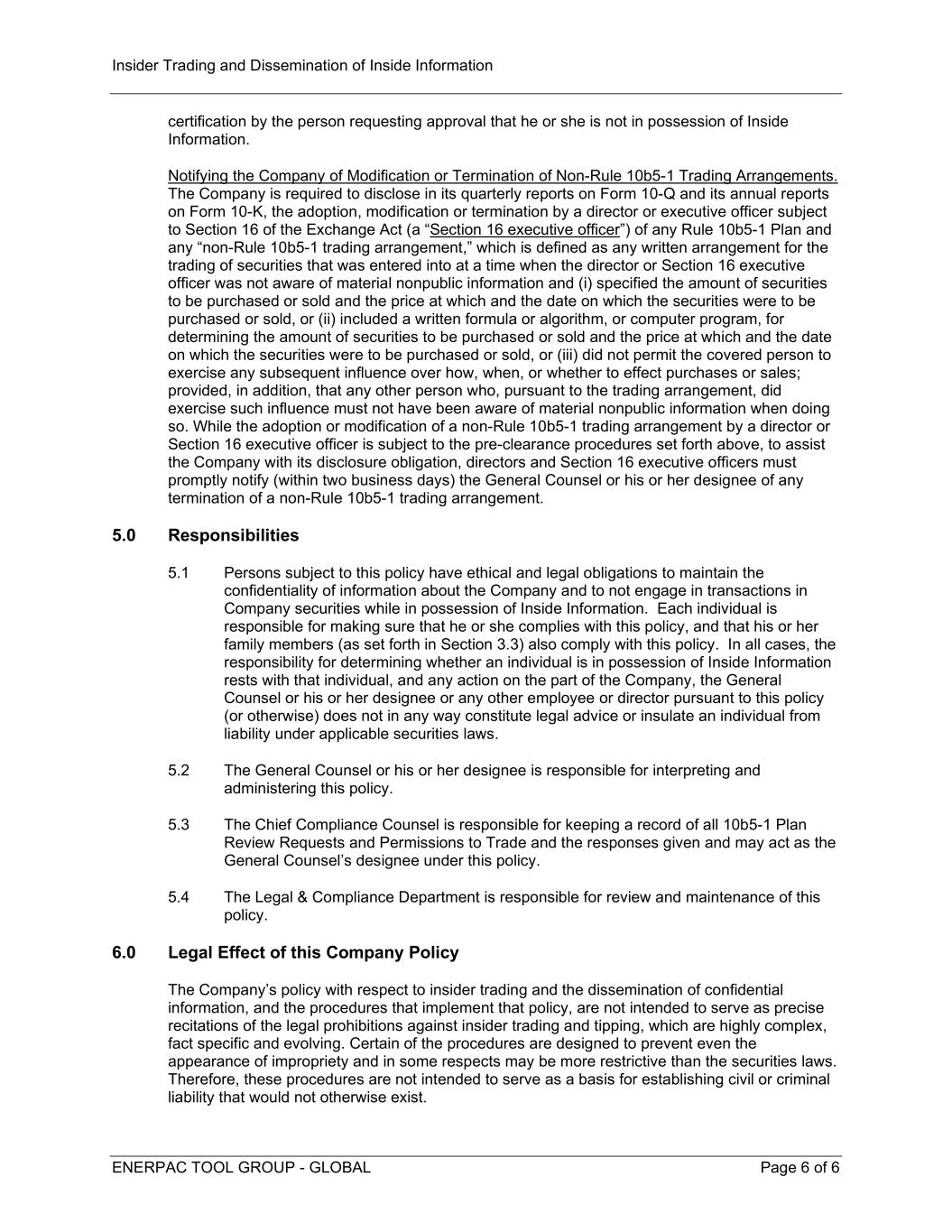
Insider Trading and Dissemination of Inside Information ENERPAC TOOL GROUP - GLOBAL Page 6 of 6 certification by the person requesting approval that he or she is not in possession of Inside Information. Notifying the Company of Modification or Termination of Non-Rule 10b5-1 Trading Arrangements. The Company is required to disclose in its quarterly reports on Form 10-Q and its annual reports on Form 10-K, the adoption, modification or termination by a director or executive officer subject to Section 16 of the Exchange Act (a “Section 16 executive officer”) of any Rule 10b5-1 Plan and any “non-Rule 10b5-1 trading arrangement,” which is defined as any written arrangement for the trading of securities that was entered into at a time when the director or Section 16 executive officer was not aware of material nonpublic information and (i) specified the amount of securities to be purchased or sold and the price at which and the date on which the securities were to be purchased or sold, or (ii) included a written formula or algorithm, or computer program, for determining the amount of securities to be purchased or sold and the price at which and the date on which the securities were to be purchased or sold, or (iii) did not permit the covered person to exercise any subsequent influence over how, when, or whether to effect purchases or sales; provided, in addition, that any other person who, pursuant to the trading arrangement, did exercise such influence must not have been aware of material nonpublic information when doing so. While the adoption or modification of a non-Rule 10b5-1 trading arrangement by a director or Section 16 executive officer is subject to the pre-clearance procedures set forth above, to assist the Company with its disclosure obligation, directors and Section 16 executive officers must promptly notify (within two business days) the General Counsel or his or her designee of any termination of a non-Rule 10b5-1 trading arrangement. 5.0 Responsibilities 5.1 Persons subject to this policy have ethical and legal obligations to maintain the confidentiality of information about the Company and to not engage in transactions in Company securities while in possession of Inside Information. Each individual is responsible for making sure that he or she complies with this policy, and that his or her family members (as set forth in Section 3.3) also comply with this policy. In all cases, the responsibility for determining whether an individual is in possession of Inside Information rests with that individual, and any action on the part of the Company, the General Counsel or his or her designee or any other employee or director pursuant to this policy (or otherwise) does not in any way constitute legal advice or insulate an individual from liability under applicable securities laws. 5.2 The General Counsel or his or her designee is responsible for interpreting and administering this policy. 5.3 The Chief Compliance Counsel is responsible for keeping a record of all 10b5-1 Plan Review Requests and Permissions to Trade and the responses given and may act as the General Counsel’s designee under this policy. 5.4 The Legal & Compliance Department is responsible for review and maintenance of this policy. 6.0 Legal Effect of this Company Policy The Company’s policy with respect to insider trading and the dissemination of confidential information, and the procedures that implement that policy, are not intended to serve as precise recitations of the legal prohibitions against insider trading and tipping, which are highly complex, fact specific and evolving. Certain of the procedures are designed to prevent even the appearance of impropriety and in some respects may be more restrictive than the securities laws. Therefore, these procedures are not intended to serve as a basis for establishing civil or criminal liability that would not otherwise exist.





